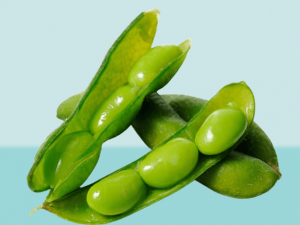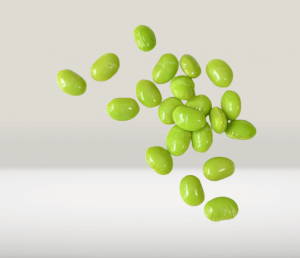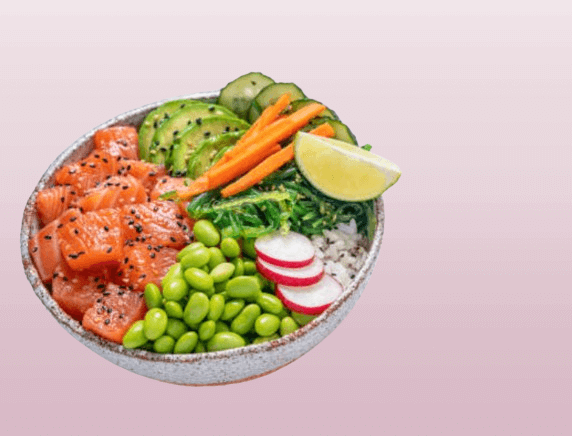If you’ve ever wondered whether it’s safe to introduce edamame to your little one’s diet, you’re not alone. As a parent, you always want to make sure you’re giving your baby the best nutrition possible. In this article, we’ll explore the question, “Can babies eat edamame?” by providing you with all the information you need to make an informed decision. So, let’s dive into the world of edamame and discover if it is suitable for your precious bundle of joy.
Can Babies Eat Edamame?
As a parent, you may be curious about introducing new foods to your little one’s diet. Edamame, those delightful and nutritious soybeans, might have caught your attention. But can babies eat edamame? Let’s take a closer look.

Overview of Edamame
First things first, let’s talk about what edamame actually is. Edamame refers to young soybeans that are still in their pods. They are harvested before the beans have fully matured, giving them a tender and succulent texture. Edamame beans are popular in Asian cuisine and are often seen as a healthy snack or appetizer.
Nutritional Benefits of Edamame
Now that we know what edamame is, let’s delve into its nutritional benefits. Edamame is packed with essential nutrients that can support your baby’s overall growth and development. These little beans are an excellent source of protein, iron, calcium, and vitamin C. They also contain fiber, folate, and antioxidants, which can contribute to a well-rounded diet for your little one.
When Can Babies Start Consuming Edamame?
Every baby is unique, and the timing of introducing solid foods can vary. Generally, it is safe to start introducing edamame to your baby’s diet around 8 to 10 months of age. At this stage, most babies have developed the necessary skills to handle solid foods and are able to chew and swallow semi-solid or mashed textures.
Read more>> Is Nauzene safe for pregnancy
Feeding Considerations for Introducing Edamame
When introducing edamame to your baby, there are a few important considerations to keep in mind.
Introduce in age-appropriate forms
To make edamame suitable and safe for your baby, it’s best to offer them in age-appropriate forms. Mash or puree the cooked edamame for infants who are just starting their solid food journey. As your baby grows and develops better chewing abilities, you can gradually introduce steamed or boiled edamame in their whole form.
Avoid Salty Or Seasoned Edamame
When preparing edamame for your little one, it’s crucial to avoid using any added salt or seasonings. Babies’ kidneys are still developing, and their sodium requirements are significantly lower than those of adults. Stick to plain and unsalted edamame to ensure their little taste buds are not overwhelmed with excessive sodium.
Monitor for allergic reactions
As with any new food introduction, it’s important to monitor your baby for any sign of allergic reactions. Allergies to soybeans, although relatively rare, are possible. Watch for symptoms such as hives, itching, swelling, vomiting, or difficulty breathing. If you notice any of these symptoms, consult your pediatrician right away.

Preparing Edamame For Babies
Preparing edamame for your little one doesn’t have to be a daunting task. Here are some simple steps to follow:
Choose fresh or frozen edamame
When it comes to selecting edamame, you have the option of either fresh or frozen. Fresh edamame can often be found in the produce section of your local grocery store, while frozen edamame is available year-round in the frozen foods aisle. Both options are equally nutritious, so choose the one that suits your convenience and availability.
Cooking methods for edamame
To prepare edamame for your baby, there are a few cooking methods you can choose from. You can steam the pods, boil them in water, or even microwave them. The cooking time will vary depending on the method and the desired tenderness of the beans. Follow the package instructions or cook until the edamame is soft and easily mashed with a fork.
Removing the beans from the pods
After cooking, it’s time to remove the beans from the pods. This step is essential to ensure that the beans are in a safe texture for your baby to consume. Gently pop the beans out of the pods using your fingers or by running a knife along the seam of the pod. Remember to discard the pods, as they can be a choking hazard for little ones.
Serving Edamame to Babies
Now that your edamame is ready, it’s time to serve them to your baby. Here are a few serving suggestions:
Mashing or pureeing for infants
For younger babies who are just starting solids, you can mash or puree the cooked edamame. Use a fork, blender, or food processor to create a smooth or slightly chunky texture, depending on your baby’s preference. You can mix the mashed edamame with breast milk, formula, or other pureed baby foods for added variety and flavor.
Offering steamed or boiled edamame
As your baby becomes more skilled at chewing, you can offer whole steamed or boiled edamame beans. Present them as a finger food that your baby can pick up and explore. The soft texture of the beans makes them easy to mush with the gums, providing an excellent sensory and self-feeding experience for your little one.
Combining with other baby-friendly foods
To make the edamame even more appealing, you can combine them with other baby-friendly foods. Add mashed edamame to pureed vegetables, grains, or protein sources to create a nutritious and well-balanced meal for your baby. Get creative with flavors and textures to make every mealtime exciting and enjoyable for your little foodie.
Avoiding Choking Hazards
We all want to ensure our babies eat safely, and edamame is no exception. Here’s how you can minimize any choking risks:
Mashing or cutting edamame into small pieces
For younger babies who are still perfecting their chewing techniques, it’s best to mash or cut the edamame into small, bite-sized pieces. This will make it easier for your baby to manage and prevent any potential choking hazards. As your baby grows and becomes more adept at chewing, you can gradually offer larger pieces.
Supervising babies while eating
Always supervise your baby while they eat, especially when introducing new foods such as edamame. Sit with your little one during mealtime and closely observe their chewing and swallowing. This way, you can respond quickly if they show any signs of distress or difficulty with handling the edamame.
Avoiding whole pods for younger babies
For younger babies, it’s important to avoid offering the edamame pods altogether, as they can pose a choking risk. Stick to serving just the beans themselves, ensuring they are the appropriate size and texture for your baby’s age and developmental stage. Safety should always be the top priority when it comes to feeding your little one.
Read more: >> Is Olipop safe during pregnancy
Signs of Allergic Reactions
While rare, allergic reactions to soybeans are possible. Here are some common symptoms to watch for:
Common symptoms of food allergies
If your baby develops a food allergy, symptoms can manifest in various ways. Look out for hives, itching, swelling (especially around the mouth or face), vomiting, diarrhea, or breathing difficulties. It’s vital to seek medical advice if you suspect an allergic reaction to edamame or any other food.
Taking precautions and consulting a pediatrician
To minimize the risk of allergic reactions, consult with your pediatrician before introducing edamame to your baby’s diet. They can help determine if your baby is at a higher risk of food allergies or if there are any precautions you should take. If your baby has a family history of soy or other food allergies, your pediatrician may recommend a more cautious approach or even suggest delaying the introduction of edamame.
Conclusion
In conclusion, edamame can be a nutritious and exciting addition to your baby’s diet. With its protein, iron, calcium, and vitamin C content, edamame offers many health benefits for your growing little one. By following the feeding considerations, preparing it appropriately, and being cautious about potential allergies and choking hazards, you can safely introduce edamame to your baby. Remember to consult your pediatrician for personalized advice and enjoy exploring new flavors and textures with your little food adventurer!
